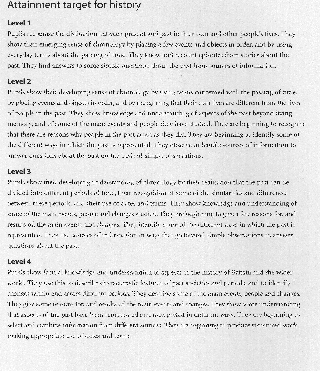Assessment in the
1990s
Perhaps unsurprisingly, there were some
problems with the sudden introduction of such a detailed model of progression
in history, and other subjects. Robert Phillips' research on teacher
perceptions of assessment arrangements found that many history teachers had
profoundly negative views of the system (Phillips, R. 1993, The first year's
implementation of KS3 in the N/C for history in England, Research papers in
Education, Vol 8, No. 3, pp. 329-353). There was very little research
evidence to support the model. Pupils sometimes ruined the whole thing by
getting level 7 but not being able to get level 4; much depended on the context
of the exercise set, sometimes pupils would 'get' a level, and sometimes they
wouldn't- or sometimes they 'got' a level but lost it the week after. Some
things appeared to have been left out- for example you could get to level 10 in
all the attainment targets but not know what century you were living in, or
what A.D. or B.C. meant. And what about pupils' understanding of substantive
concepts? The system appeared to take no account of these. There were also many
from 'the old school' who argued that pupils should be assessed on their
knowledge of particular subject content areas.
As well as conceptual flaws in the model,
there was the fact that it was a nightmare to administer. Teachers argued that
the assessment model made the delivery of the National Curriculum unmanageable,
and threatened to take action. A review of the National Curriculum was
instigated. Interestingly, rather than turning to 'the educational
establishment' (professionals involved in education and a term of abuse at this
time) they asked a man from the Post Office to sort it all out. After the
Dearing Review of the National Curriculum, assessment arrangements were
revamped- and simplified, in N/C Mark 2, and there was a move away from
breaking it all down into bits, and towards a more holistic approach of 'best
fit' level descriptors. Also, there was to be just one profile component,
'History' (easy to remember).

It doesn't matter that you can't read this;
you should be familiar with the levels system if you are training to be a
history teacher. The details can be found at the back of History: The
National Curriculum for England (http://www.nc.uk.net)
There were some amendments to this model with
the introduction of Curriculum 2000 (in effect National Curriculum Mark
3). The 5 Key Elements were rechristened as the 5 areas of Knowledge, skills
and understanding, there were minor changes in wording, but the most striking
feature of N/C Mark 3 was continuity with N/C Mark 2.
There were some significant changes to the
general aims and values stipulated in N/C Mark 3, and in terms of the status
and nature of education for citizenship, thinking skills, financial capability
and sustainable development, and in terms of the specification of the 'General
Teaching Requirements' (pp. 26-36).
Compare the following pupil's end of year
report (and the world of CATS, YELLIS, ALIS etc), with the example of a report
from the 1960s and it is easy to see that assessment
had come a long way since the 1960s, but the revolution in assessment and
accountability was not cost free in terms of the amount of teacher and pupil
time devoted to assessment.
|
A High
School
|
|
Subject :
Science
|
|
Name: A pupil
|
|
Effort grade:
A
|
|
Attainment grade:
A
|
|
Set: 6 (out of
8)
|
|
Key stage 3 Teacher
Assessment: Level 7
|
|
Key stage 3 NC SAT
Assessment: Level 5
|
|
Teacher Comment:
Anthony has achieved an average of 87% in the class Science tests this year;
the class average is 72%. He is a bright boy who has steadily improved and
worked hard. His written work is consistently good but homeworks could be more
thorough, methodical and neat. He could also ask and answer more questions in
class. At the moment, Physics is his weakest area; he must make sure that he
puts extra effort in here so that it does not develop into a long-term
weakness. His performance in the Standard Assessment Tests did not reflect his
term performance. This is perhaps because he did not revise thoroughly, or with
method and organisation. If he continuse to work hard, he is capable of a good
performance at GCSE.
|
It should be stressed that level descriptors
are supposed to be end of key stage instruments- there is more to assessment
than assigning a level to pupils' work. QCA have set up a web site with
examples of pupils work in history- see http://www.ncaction.org.uk (See also
Scott Harrison's article in Teaching History No. 94)
There is currently a debate about whether
changes in assessment, and the development of banks of assessment data are
helping to drive up standards in education, or whether the emphasis on
accountability and comparison is deflecting attention away from the formative,
developmental aspects of assessment (see for instance, Assessment for
learning: beyond the Black Box, The Assessment Reform Group, a short
pamphlet available from University of Cambridge, School of Education,
Shaftesbury Rd., Cambridge, CB2 2 BX.
Back to Assessment homepage
Back to History PGCE
|